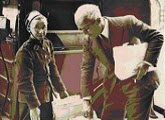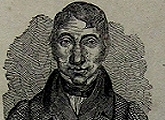X: General elections

The Houses of Parliament seen from the London Eye. Photograph copyright
© 2005 Archives Hub.
A general election is one in which all of the Members of Parliament forming the House of Commons are elected at the same time, and this happens at least once every five years. The UK is divided into 659 constituencies, and each constituency has a Member of Parliament. A general election has been called for May 5th this year, and so this month we are highlighting related collections described on the Archives Hub: ephemera, records of political parties, electoral boundaries and trends, some views from other angles, and selected web links.
 Collections
Collections
General elections ephemera
Since 1945, the library of the London School of Economics has collected campaign material, such as leaflets and posters, produced by political parties and individual candidates. Material relating to the 1951 general election (Prime Minister Winston Churchill, Conservative) is not held as a separate collection.
left: detail of cover of Keir Hardie's 1906 general election address. Photograph courtesy Archives Division, London School of Economics Library.
- 1945 Clement Attlee (Labour)
- 1955 Anthony Eden (Conservative)
- 1959 Harold Macmillan (Conservative)
- 1964 Harold Wilson (Labour)
- 1966 Harold Wilson (Labour)
- 1970 Edward Heath (Conservative)
- 1974 Harold Wilson (Labour)
- 1979 Margaret Thatcher (Conservative)
- 1983 Margaret Thatcher (Conservative)
- 1987 Margaret Thatcher (Conservative)
- 1992 John Major (Conservative)
- 1997 Tony Blair (Labour)
- 2001 Tony Blair (Labour)
Political parties
This is not intended as an exhaustive - or balanced - list of past or present political parties. This list simply represents the archival collections of political parties that have been described on the Archives Hub.
- British Socialist Party: formed in 1911.
- Common Wealth Party: formed in 1942 and originally chaired by the writer JB Priestley (1894-1984).
- Communist Party of Great Britain (CPGB): founded in 1920.
- Conservative Party: evolved from the 17th century 'Tories', adopted the name Conservative Party in the 1840s; the formal name is the Conservative and Unionist Party [this is the description for the papers of Party Chairman Lord Thorneycroft]
- Distributist Party: founded in 1926, with the writer GK Chesterton (1874-1936) as President.
- Labour Party: established as the Labour Representation Committee at a special meeting of the Trade Union Congress in 1900, adopted the name Labour Party in 1906 [this is the description for the records of Chief Woman Officers]
- Liberal Party: evolved from 17th century 'Whigs', adopted the name Liberal Party in 1839 [this is the description for the records of the National Liberal Club]
- Plaid Cymru: founded as Plaid Genedlaethol Cymru (Welsh Nationalist Party) in 1925, later changed its name to Plaid Cymru (Party of Wales).
- Scottish Green Party: became independent of the UK Green Party in 1990.
- Scottish National Party (SNP): founded in 1932.
- Social Democratic Party (SDP) formed in 1981, and the Social Democratic Party Scotland.
- Wessex Regional Party: founded in 1974 by Alexander Thynn (born 1932), later Lord Bath.
How we vote
- Boundary Commission for England: set up in 1944 as an independent body to regularly review parliamentary constituencies
- British Election Studies: surveys of electoral behaviour since 1963 (UK Data Archive)
Other views
- Marjorie Leaf (fl 1984): reminiscences of life at the Prime Minister's official residence, 1937-1940
- Emma Goldman (1869-1940): influential anarchist
You might also be interested in...
Betty Boothroyd

Find out more




